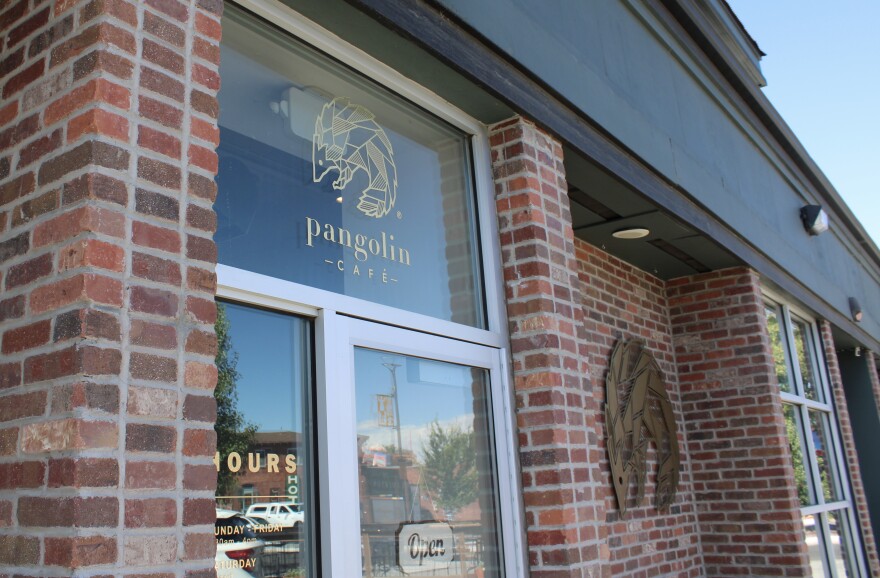When you first walk up to Pangolin Cafe you see an image of a pangolin on the building’s brick wall. You’re left to wonder: what kind of animal is this? Maybe a modern dinosaur or a…scaly anteater?
Baristas at the cafe often get asked the questions: what is a pangolin? And why make a cafe about it?
The idea behind the cafe spans three years, and it all started with a certain type of candy.
In 2016, co-owner Travis Sandefur and his wife trained in Istanbul, Turkey for Adventist Health International, a nonprofit healthcare organization. When they weren’t training, Sandefur and his wife explored Turkey. They were walking down Istiklal Street, a popular stop with shops and restaurants, when the pair first came across Turkish Delights. These are sweet, chewy candies also known as lokum.
The colorful confections are usually dusted in white powder and are made with a combination of starch, water and sugar. They can come in different flavors, and oftentimes nuts are added, like pistachios.

Sandefur fell in love with lokum. Although he and his wife had to continue on to Zambia to start their work, he couldn’t forget the sweet.
While in Zambia Sandefur learned about pangolins, and the sad truth about them.
Pangolins are the most trafficked mammal in the world, according to Save Pangolins, a global conservation organization for the animal. People use their scales and meat for traditional medicine, retail leather products, and food. The eight different species range from vulnerable to critically endangered.
Sandefur developed a love for pangolins, just like he did for lokum.
After two years in Zambia, Sandefur went to Konya, Turkey in early 2018 to train with a lokum confection master. Google Translate was used a lot in the couple of weeks they worked together. It would take another six months of cooking lokum in the U.S. before he perfected his recipe.
When he returned to the U.S., Sandefur shared his idea with Joel Stewart, his brother-in-law, who would eventually become a co-owner of the coffee shop.
“As I shared the idea with other people, most people thought that I had lost my mind for even considering this idea. And Joel was one of the few who seemed to share a lot of the interest and the passion,” Sandefur said.
Stewart was a fan of raising awareness for the endangered species and experimenting with lokum. The candy doesn't have a preservative taste like other gummies sometimes do, he said.
“Turkish delight is such a unique thing here in the U.S. that you don’t find,” Stewart said.
The cafe has one employee that specifically makes the lokum and the owners will step in when needed. One batch makes 15 pounds of the candy. The process takes about two hours, Sandefur said.
The cafe has been open for five years. They opened in 2019, but COVID made them temporarily shut their doors.
“We were brand new, we had just opened up like four months before. So we were trying to figure out what running a business in the hospitality space was like,” Stewart said.
Shane Trivitt, a student at the University of Nevada, Reno, has worked at the cafe for a little over three years. The cafe was able to keep him on payroll during the time that they were closed, he said.
“I’ve always just loved coffee and the art of making [it] and the art of roasting [it]. Coffee is just an amazing thing that connects people,” he said.

Now, the cafe is thriving. At 10 on a weekday morning, it buzzed with customers and the sound of coffee machines.
Emma Speicher sat in the cafe drinking one of their featured drinks, a Cubano Breve. Jazz music played over the cafe’s speakers. She’s back in Reno, her hometown, for summer break. She already knew what a pangolin was before she came into the coffee shop, she said.
“It was like a special interest animal that I had when I was a kid. I thought they were really cool. Like little armadillos, but cuter,” she said.
Kade Collins sat at the table with her. He decided to get an iced coffee for his first visit to the cafe.
“I had no idea what a pangolin was. That’s an interesting cause, especially just kind of how random it is here,” he said.
David Libby, who has lived in Reno for four years, is one of the cafe’s regulars. He comes in pretty much every day.
“I don’t even have to order anymore. Everyday I come in and they know I’m getting a quad shot iced caramel latte,” he said.
Sandefur and Stewart are planning on expanding the business nationally, but for now, it’s a Reno specialty.
And in case you’re wondering, a pangolin is a mammal that’s covered in brown or gray scales, and found in either Africa or Asia. They eat ants with their long snouts and even longer tongues that can reach insects in the ground, but they’re not related to anteaters. And no, they aren’t related to dinosaurs.
KUNR’s Ember Braun is a student at the Reynolds School of Journalism.



